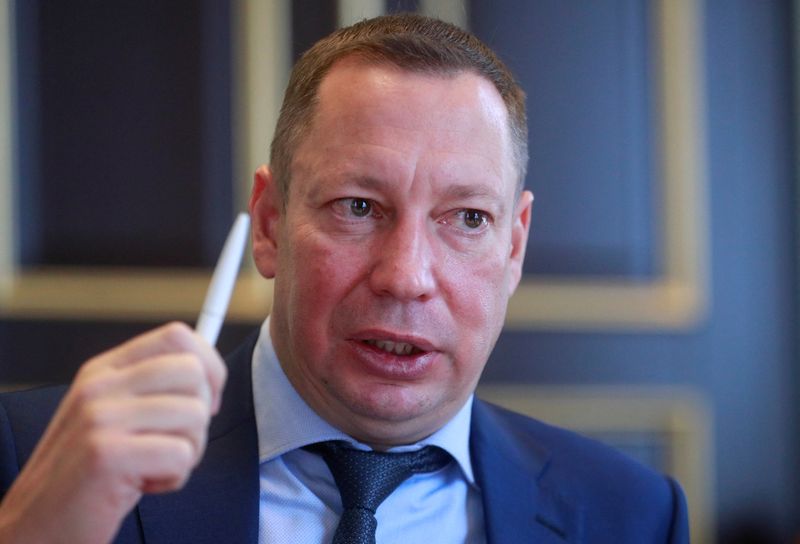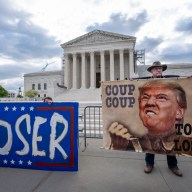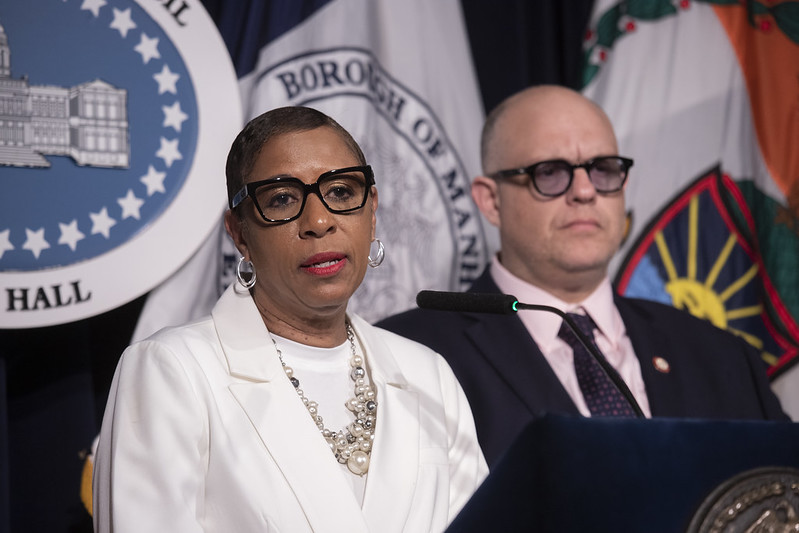KYIV (Reuters) – Ukraine wants to launch talks with the International Monetary Fund on a new programme in April to reassure markets that have been rattled by tensions with Russia, Central Bank Governor Kyrylo Shevchenko told Reuters.
Speaking in an interview in his office late on Monday, Shevchenko ruled out imposing any administrative restrictions on the hryvnia currency, saying these would be counterproductive by agitating markets rather than offering stability.
He also said the central bank would remain “hawkish” on fighting inflation, leaving open the possibility of raising interest rates beyond the planned hike to 11% at the next monetary policy meeting in March.
The threat of major war in Ukraine after Russia massed troops and announced their deployment in Moscow-controlled separatist regions has pummelled Ukrainian assets. The hryvnia fell by more than 1% in early trading on Tuesday.
Ukrainian President Volodymyr Zelenskiy’s administration has stressed the importance of shielding the economy from the fallout, while the central bank has sold more than $1.4 billion in forex reserves to keep the hryvnia stable since January.
“We need to discuss a new programme with the IMF now, there will be a very good platform – the spring meeting of the IMF in April,” Shevchenko said.
The current $5 billion stand-by expires in June, and Ukraine expects to receive the remaining $2.2 billion in the first half of the year, including $700 million in March.
“It will be a good signal for the markets that we expect the IMF mission to start soon,” Shevchenko said.
Ukraine is relying on such assistance as spiking yields have hobbled borrowing on external capital markets.
“We hope that in the next few months the country will have the opportunity to compensate for the complicated access to foreign markets with sources of official funding,” he said
NO RESTRICTIONS ON CURRENCY MARKET
Shevchenko said that the central bank would continue the floating exchange rate policy.
The hryvnia has weakened by 6% against the U.S. dollar since the start of the year as a result of outflows of more that $600 million of foreign capital from the domestic bonds and increased demand from energy importers.
The bank believes that mainly psychological factors, not macroeconomic reasons, triggered market volatility.
“We are deeply convinced that now there is no need to introduce any administrative restrictions. From our point of view, administrative restrictions, on the contrary, provoke a stir,” Shevchenko said.
According to him, international currency reserves, currently at $28 billion, allow the bank to continue interventions to smooth out fluctuations in the market.
“The National Bank does not have either a target for the exchange rate or a corridor that it would target. The rate will depend on supply and demand in the market,” he said.
He said that, due to the interventions, the volume of net international reserves fell below the level agreed in the memorandum with the IMF. But he did not think this would derail Ukraine’s prospects of securing the next tranche.
He suggested the IMF would be open to discussing a revised target level of reserve.
” … naturally, no one expected that Ukraine would need to spend significant amounts from reserves in order to smooth out currency fluctuations at the beginning of 2022,” Shevchenko said.
HAWKISH MONETARY POLICY
Shevchenko said that the bank was ready to continue a tight monetary policy to bring inflation back to the target range of 5%, though he believed that inflation already peaked last September.
“We said that we forecasted further rate hikes and are prepared to act more decisively if we see pro-inflationary pressure. We are ready to further tighten monetary policy in order to bring inflation back to the target,” he said.
The bank has increased the rate six times since last March to 10% from the historical law of 6% to restrain persistently high inflation. Inflation slowed to 10% in December and January from a 2021 peak of 11% in September.
Asked if the central bank may raise the rate higher than the envisaged 11% in March, Shevchenko said: “We are still hawkish. The National Bank has such readiness. High inflation hits the pocket of every person”.
(Editing by Matthias Williams, William Maclean)



















